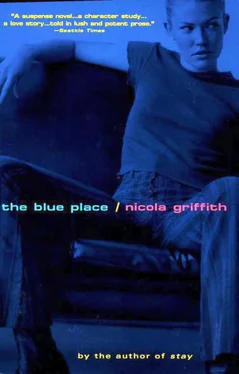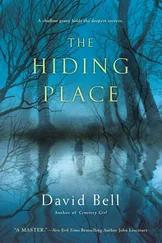“Captain Denneny wouldn’t approve of what I’m going to say but he’s not here. If you’re not sure you can handle a suspect, hit them a good one in the stomach. About here.” I pointed to my solar plexus. “It won’t bruise or swell so you can deny it later if you have to. Use the tip of your baton. If you’re too enthusiastic you could damage them. Then you say they fell onto the corner of an open door of your vehicle as you were trying to restrain them.”
Red was looking around uneasily. The two muscle guys were impassive. Miebach seemed to be listening to her internal organs.
“If you want to knock someone senseless without leaving a bruise, go for a palm strike to the forehead. Then there’s the knee. They can’t run after you if they can’t use one of their legs. Some places you must never hit: the throat and neck, the eyes, the back of the head, the genitals. If you get hauled up on a case with the perp showing injuries in those areas, you don’t have a chance. And remember this.” I smiled. “Any perp could be someone important. If you hurt them, their lawyers could take your badge or maybe even put you in jail. And we all know what happens to police officers in jail. Be clear on this point: if they’re not crazy or dusted and you hurt them, you’re incompetent. All your fellow officers will know that. They won’t want to work with you because if you’re incompetent you won’t be any good in a situation. So don’t hurt a perp if you don’t have to. And if you have to hurt them, don’t hurt them more than necessary. And don’t get caught.”
I looked at my watch. Seven fifty-five. “Okay, people, that’s it. Next time I want you warmed up by the time I arrive.”
I sent them on their way. They wouldn’t have time to shower before reporting to the squad room for day shift. Too bad.
When they had gone, I took off my shoes, stood in the middle of the floor and closed my eyes. Soft hiss of air-conditioning. Faraway rumble of East Ponce traffic. Slow-turning thump of my heart. I breathed deeply, in and in until my belly swelled with air, out again through my nose, in, out, letting my hands rise a little with each inhalation. Then I stretched up, and up farther, held it, came down, palms to the floor. Held it, held it, and on the outbreath bent my elbows farther.
I moved through my routine automatically, stretching tendons and ligaments and muscles, and after twenty minutes I was as flexible as a whip.
There are only four schools of Shuto Kai karate outside Japan. I had learned it in England, on Tuesday evenings and Sunday mornings in an old community centre whose concrete floors were always still sticky with spilled beer and cigarette ash from the event the night before. I had studied with five men under the instruction of a truck driver with a sturdy Yorkshire accent and a real love of the art. He taught me the way of the empty hand. I would kneel in zazen on that unheated concrete floor in the middle of winter and extend my arms. He would lay a heavy pole across my wrists, and the battle would begin, the battle of breath and pain and will. The first five minutes were easy, the next ten just about bearable, the next thirty a nightmare. Sweat would roll down my neck, and Ian’s voice boomed from the walls and rattled the children’s drawings pinned there. “Breathe through the pain! Breathe! With me, in and out . In and out .” And my shoulder muscles, which had already taken me through two hundred push-ups and an hour of sparring, burnt dully, then sharply, then with pain bigger than the world. And the only way through it was the breath. In and out. Falter and you are lost.
And after forty or fifty minutes, the endorphins kick in and the childish drawings on the wall assume a crystalline edge, the colours deepen and bloom, and my face relaxes utterly. All there is, is a tide of breath, sweeping up and down the beach of my body, until each cell is as distinct as a grain of mica and I feel washed clean. I sometimes wondered what would happen if I just…stayed there; whether the endorphin high would burn itself into my cells permanently and for the rest of my life I would smile gently around the edges, even when I was breaking someone’s legs. But then Ian would take the pole away, shout, and we would run around and around the hall. Twenty minutes. Two or three miles, usually. Then we would do a kata.
Katas are choreographed series of fight moves against one or more imaginary opponents. Done well, they are a meditation and a dance. They range from the most simple, railway-straight line moves against only one opponent where you use nothing but punches, to the flying, whirling battle-an-army dance of the Basai Dai. You don’t learn the Basai Dai until you get your black belt.
The first few months I studied, the katas were my reward: the fluid dance, the grace, the hot whistling power of punching tight air, of using my whole body. It was only after my blue belt, the second kyu, that I learnt that the real reward of Shuto Kai was understanding my will. I learnt that pain is only pain: a message. You can choose to ignore the message. Your body can do a great deal more than it wants you to know.
And so, although for all practical purposes Shuto Kai is not a particularly good martial art, I still dance its katas.
I did the fourth, which has all those difficult kicks, and the Basai Dai. My breathing was as smooth as cream, my blood oxygenated and rich. I was probably smiling.
I moved on from karate to kung fu, a Wing Chun form, the Siu Nim Tao, or Simple Idea. I was on the second round of pak sao, the slapping hand, when the door opened. Even with my eyes closed I would have known who it was. Her scent was a little more pronounced today, even though her hair was dry. I nodded very briefly but did not stop. Ding jem. Huen sao. She started stretching. Bill jee. Moot sao, the whipping hand. She was wearing black spandex pants and an emerald body sheath. I concentrated on the form.
When I took the last slow breath and released it, she straightened. “First form?”
“Yes.”
“Want to chi sao?” It was a challenge.
“Take off your shoes.”
“My shoes?”
“I value my feet.”
That angered her. It was meant to. Always take the advantage. I extended my right leg, and my right arm, elbow down and in, wrist level with my sternum. She did the same. The backs of our wrists touched. Well-shaped nails, no wedding ring. Her skin was dense and fine-grained, taut over smooth muscle, and her bones slender. She looked the sort of woman who has studied ballet for twelve years. Her eyes were blue, the deep blue of still-wet-from-the-dye denim, with lighter flecks near pupils tight with concentration. Her hair was in a French twist. A French twist for the gym.
Chi sao means sticky hand. The wrists stay touching. All moves are in slow motion. It’s a game of chess using balance.
I moved my hand forward, the first inch of what could have become huen sao, the circling hand, but she stepped smoothly to the side and, without even moving her arm, countered. But the counter of course became her own move, which was to keep stepping, trying to lead my arm away from the centre of my body and leave me unbalanced. So far, all beginner’s moves. Her baked-biscuit skin slid back and forth over her collarbone. As the pace intensified, I wondered how women got those tans. The colour was delicate, never too heavy, never too light, and they had it in February and November yet they never seemed to use tanning salons. Their eyebrows always arched perfectly and their hair was never out of place.
Who are you ? Blank concentration for a reply.
She was good: well balanced, smooth, knowledgeable about the connections between feet and belly, wrist and elbow and shoulder. She centred well and breathed unhurriedly.
Читать дальше












